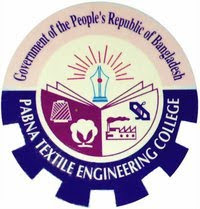Established in 1925 as a weaving school, it was renamed the Pabna Textile Engineering College on 25 June 1926 after a visit by the Governor of the British Government.
During the 1980s and 1990s, the college underwent two further name changes, first in 1980 to the District Textile Institute, and later in 1993-1994 to Diploma in Textile Technology.
The Pabna Textile Engineering College was re-opened on 17 March 2007 by Secretary Md. Abdur Rashid Sharkar, of the Ministry of Jute and Textile of the Bangladesh Government. The college is a government-run organization under the Ministry of Jute and Textile, with course curriculum set by the University of Rajshahi. The college currently offers a four-year bachelor degree in textile engineering, and hosts around 320 students.
The entry requirements for admission test are:
During the 1980s and 1990s, the college underwent two further name changes, first in 1980 to the District Textile Institute, and later in 1993-1994 to Diploma in Textile Technology.
The Pabna Textile Engineering College was re-opened on 17 March 2007 by Secretary Md. Abdur Rashid Sharkar, of the Ministry of Jute and Textile of the Bangladesh Government. The college is a government-run organization under the Ministry of Jute and Textile, with course curriculum set by the University of Rajshahi. The college currently offers a four-year bachelor degree in textile engineering, and hosts around 320 students.
First year
The first year syllabus consists of science pure science in addition to some basic concepts of Textile Engineering.- Physics-1
- Physics-2
- Chemistry-1
- Chemistry-2
- Mathematics-1
- Mathematics-2
- Textile Raw Material-
- Polymer Science
- Engineering Drawing
- Engineering Material and Practices
Second year
From second year and onward students acquire wide range of theoretical and practical knowledge in the area of Textile Engineering which equip them for future employment. Subject offered in second year are:- Yarn Manufacturing-1
- Fabric Manufacturing-1
- Wet Processing-1
- Garments Manufacturing-1
- Fabric Structure and Design
- Textile Raw Material-2
- Textile Physics-1
- Textile Testing and Quality Control-1
- Statistics
- Elements of Electrical Engineering and Electronics
- Elements of Mechanical Engineering and Machine Design
- Computer Science
Third year
Subjects offered in third year:- Yarn Manufacturing-2
- Fabric Manufacturing-2
- Wet Processing-2
- Garments Manufacturing-2
- Textile Physics-2
- Textile Testing and Quality Control-2
- Industrial Psychology and Management
- Sociology
- Application of Computer in Textiles
Fourth year
In the fourth or final year students have to choose group of subjects for specialization. Subjects offered in fourth year are-- Advanced Yarn / Fabric / Wet processing / Garments Manufacturing
- Special Yarn / Fabric / Wet processing / Garments Manufacturing
- Utility services and Maintenance of Textile Machinery
- Textile Testing and Quality Control-3
- Production Planning and Control
- Industrial Economics, Accounting and Marketing
- Project Work
- Industrial Attachment
- Comprehensive Viva
Students
At present approximately 320 students are enrolled in this college, of which around 15% are female.Admission General admission procedure and entry requirements
Admission to the Pabna Textile Engineering College is highly competitive and needs a high academic attainment in S.S.C and H.S.C level. Selection of the student for admission is made through admission test of 200 marks. Students get chance to take admission according to merit.The entry requirements for admission test are:
- Students must be Bangladeshi by birth.
- Passed S.S.C. (Sc) with first division / GPA 4.5 from any Board of Intermediate & Secondary Education or equivalent.
- Passed H.S.C (Sc) or equivalent examination of the current academic year obtaining at least GPA 4.5 and on an average at least 4.5 but individually not below grade B in Physics, Chemistry and Mathematics. Students passed intermediate past academic year can also apply.
- Students must obtain S.S.C (Sc) & H.S.C. (Sc) GPA total of 9.00

No comments:
Post a Comment